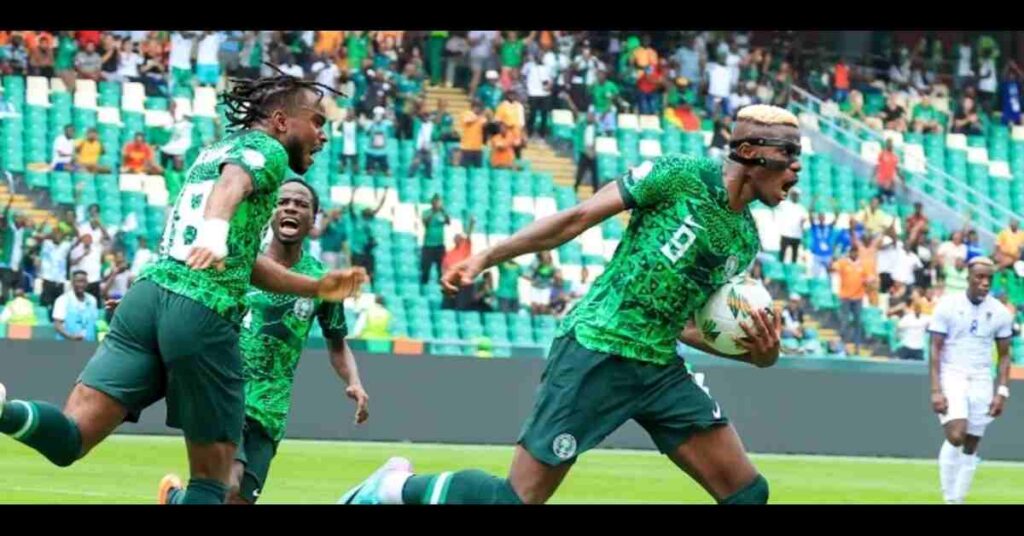In a gripping encounter at the Alassane Ouattara Stadium in Ebimpe, Abidjan, the Super Eagles of Nigeria were held to a 1-1 draw by Equatorial Guinea in their first match of the Africa Cup of Nations 2024. Despite missing key players like Victor Boniface, Wilfred Ndidi, Kelechi Iheanacho, and Sadiq Umar due to injuries, Nigeria entered the game with high spirits, led by African Footballer of The Year Victor Osimhen.
The match saw an early opportunity for Nigeria as Osimhen missed a chance in the 4th minute following a blunder by Equatorial Guinea’s goalkeeper. Nigeria’s coach, Jose Peserios, made a strategic decision by starting Stanley Nwabali as the goalkeeper, replacing Francis Uzoho amidst recent criticisms.
The game intensified when Equatorial Guinea’s Iban Salvador scored in the 37th minute, catching the Nigerian defence off-guard. However, Nigeria quickly responded, with Alex Iwobi assisting Osimhen to equalize shortly after.
Nigeria’s relentless pressure marked the second half, but Equatorial Guinea’s goalkeeper Owono remained formidable, thwarting several attempts. A notable moment was Alhassan Yusuf’s injury, leading to his substitution, and Peserio’s tactical changes by bringing on Joe Aribo and Samuel Chukwueze.
Despite a few close calls, including a missed opportunity by Osimhen in the 76th minute, the match ended in a draw, showcasing Equatorial Guinea’s solid defense against the 2013 champions.
The Bet9ja promotion code for April 2025 is YOHAIG. Bet9japromotioncode.com.ng has more info about the Bet9ja promotion code 2025 in Nigeria. Follow this link for more - https://www.bet9japromotioncode.com.ng/. This Bet9ja promo code gives a Bet9ja welcome bonus of up to ₦100,000 on your first deposit. The minimum deposit to bet is ₦100! USE the Bet9ja login signup and the Bet9ja bonus code to get started today on the Bet9ja website. Bet9ja offers a 170 per cent multiple boost bonus and a free bet for either Bet9ja sport or Bet9ja casino. To open a Bet9ja account and be a Bet9ja customer, you must go through the registration process here. Terms and conditions apply when you register with Bet9ja to get the bonus.
---------------------------------------------------------------------------------------------------------------------------
Editorial
As we reflect on the recent match between Nigeria and Equatorial Guinea, it’s evident that football is a game of unpredictability and resilience. The Super Eagles, despite their reputation and the presence of star players like Victor Osimhen, faced a formidable challenge against Equatorial Guinea. This match serves as a reminder that underdogs can rise to the occasion in football, and established teams must constantly evolve to maintain their dominance.
The injuries to vital Nigerian players underscore the importance of depth in a squad. It’s not just about the star players; it’s about the collective strength and adaptability of the team. The decision to start Stanley Nwabali in goal was a bold move by Peserios, reflecting the need for coaches to make tough decisions under pressure.
Equatorial Guinea’s performance was a testament to strategic discipline and the power of a united defensive front. Their ability to hold off a team like Nigeria speaks volumes about their preparation and mental fortitude. This match was a test of skill and a battle of strategies, where both teams showcased their tactical acumen.
As we progress in this tournament, let’s remember the lessons from this match. It’s not just about the big names or past achievements; it’s about how teams adapt, strategize, and perform under pressure. This is the beauty of football – a sport where anything can happen and often does.
Did You Know?
- The Africa Cup of Nations was first held in 1957, making it one of the oldest continental football championships in the world.
- Nigeria has won the Africa Cup of Nations three times, with their last victory in 2013.
- The Alassane Ouattara Stadium in Ebimpe, Abidjan, is one of the newest and most modern stadiums in West Africa.
- Equatorial Guinea’s best performance in the Africa Cup of Nations was reaching the semi-finals in 2015 when they hosted the tournament.
- The Africa Cup of Nations was expanded to include 24 teams for the first time in 2019, up from the previous 16-team format.


